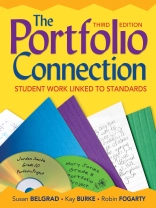‘As a new teacher, I am always looking for ideas that will make me feel more confident. Using a portfolio will help me show evidence that the students are making progress toward meeting state standards.’
—Stephanie Jones, Teacher
Forrest City High School, AR
‘A good overview of the entire portfolio process, from its philosophical foundations to the celebration of student achievement.’
—Michael F. Dwyer, English Department Chair
Otter Valley Union High School, Brandon, VT
Encourage student creativity and academic growth through portfolios and authentic assessment!
Research and practice show that portfolios are powerful tools for assessing students authentically, communicating with parents about the learning process, and helping learners across all grade levels and content areas record their successes and take ownership of their learning.
The third edition of The Portfolio Connection offers practical advice and reader-friendly strategies for implementing student portfolios in the classroom. Through step-by-step procedures, the authors help teachers incorporate standards into the portfolio process by providing expanded checklists and rubrics to monitor student progress. The updated edition also includes:
- Additional information on e-portfolios and integrating technology
- Steps for conducting student-led conferences
- Portfolio examples for children with special needs
- Guidance on increasing parent involvement
- Information on the impact of NCLB on student assessment
Discover how you can use portfolios to heighten students′ self-reflection while expanding their critical and creative thinking skills.
Зміст
Preface
Acknowledgments
About the Authors
Introduction
1. Connect Portfolio Purpose to Audience
2. Connect Portfolio Design to Developmental Stages
3. Connect Portfolio Content to Local and State Standards and Curricula
4. Connect Portfolio Purpose Through Students′ Collections, Reflections, and Selections
5. Connect Students′ Reflections and Self-Assessments to Criteria, Rubrics, and Standards
6. Connect Students′ Voices Through Web Conferences and Showcases
Conclusion
Appendix
References
Additional Reading
Index
Про автора
Robin Fogarty is President of RFA: A Robin Fogarty Company, a Chicago-based, minority-owned, educational publishing/consulting company. Robin received her doctorate in curriculum and human resource development from Loyola University of Chicago. A leading proponent of the thoughtful classroom, Robin has trained educators throughout the world in curriculum, instruction and assessment strategies.She has taught at all levels, from kindergarten to college, served as an administrator, and consulted with state departments and ministries of education in the United States, Puerto Rico, Russia, Canada, Australia, New Zealand, Germany, Great Britain, Singapore, South Korea, the Netherlands, the Kingdom of Bahrain and Saudi Arabia. Robin has published articles in Educational Leadership, Phi Delta Kappan, The Journal of Staff Development and The Middle School Lournal. She is the author of numerous publications, including Brain-Compatible Classrooms, Literacy Matters, Ten Things New Teachers Need, How to Integrate the Curricula, The Adult Learner, A Look at Transfer, Close the Achievement Gap, Twelve Brain Principles, Nine Best Practices, and From Staff Room to Classroom: Planning and Coaching Professional Learning, How to Teach Thinking Skills Within the Common Core: 7 Key Student Proficiencies of the New National Standards, Invite! Excite! Ignite! 13 Principles for Teaching, Learning and Leading K-12 classrooms Robin received her Bachelor of Arts in Early Childhood Education at SUNY, Potsdam, NY, and her Masters in Instructional Strategies from National Louis University in Evanston, IL. She is known as the teachers’ teacher and has mentored numerous colleagues in the art and science of working with the adult learner. She brings a wealth of knowledge and passion to all endeavors, has a wealth of knowledge in the field and conducts highly interactive PD sessions.












